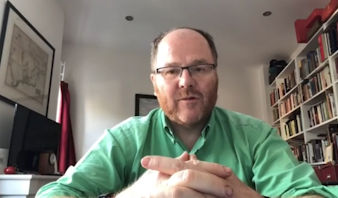As you can imagine, I’ve had several hundred emails on this. I’ve read them all. (Every night, my team provide me with a folder full of campaign and policy emails received that day for me to read through).
That’s why I thought it would be helpful to set out my response on all the key arguments.
Let me start by saying that, like all MPs in Parliament, I was absolutely sickened, appalled and outraged at the death of George Floyd. I share the widespread horror at the sight of a man being killed by a policeman with his hands in his pockets, watched by two colleagues, kneeling on the man’s neck while he calls out “I can’t breathe”.
I join with all those across the globe who are peacefully demanding urgent and wide-scale change and reform. Both in the US criminal justice system - and here in our own country where necessary, to tackle institutional prejudice. Leaving aside race for a moment, the George Floyd killing is a shocking example of police brutality and a breach of fundamental common human decency. Sadly, it is another example of the racial prejudice which the American justice system has struggled with for decades. Some ask what it has to do with us? Whilst US justice and domestic racial politics is a matter for the US, at a time when the values and security of western liberal democracy faces huge pressure around the world, our authority is heavily influenced by our ability to practise what we preach. If we want to take a stand on Chinese abuse of minorities, or Muslim extremism, I believe it is vital that we practise what we preach. And that as old allies and friends of the USA we let them know when we are concerned about the impact of problems like this on our shared values. So I do believe this is a hugely important moment for the United Kingdom and the west. Indeed, the world.
But, that said, I do not support the way the George Floyd killing has been used to justify a wave of street violence nor mob attacks on all historical statues and monuments related to public figures in this country celebrated when we were a major part of the global slave trade in the 17th and 18th centuries, before it was abolished (by this country). Toppling statues, attacking the police and violent behaviour is unlawful and must be treated as such. We cannot - and must not - let the actions of small fringe groups get in the way of ensuring the George Floyd tragedy is a catalyst for real progress. That’s why, as you may have seen in the media, I have called for universities to consider a better approach than pulling down statues to appease the “mob” - instead putting UP statues to abolitionists like Wilberforce and BAME campaigners like Martin Luther King, Ghandi and Nelson Mandela, and as Universities to invest n courses which educate today’s generation in both the history of slavery and the ongoing scale of human trafficking including here in the UK, especially linked to the sex trade and illegal economic migration. From my earliest days as a teenager experiencing and then campaigning against the loathsome apartheid regime in South Africa, I have always seen a commitment to fighting racial inequality as part of a broader commitment to tolerance, decency and basic human rights.
I can’t claim to truly understand the life experiences of those who face institutional racism. But what I can do - as an MP, a father and a citizen - is listen and commit to supporting all those in our local community and nationally who are fighting for equality, justice and diversity every single day. As a proud One Nation Conservative MP, I am committed to the politics of inclusion and fairness. That has always been my mission and my pledge as a public servant. And it continues to my deepest pledge now.
As many have highlighted, the need for reform is urgent and change must not be delayed yet again. Whether it is making black history mandatory in the national curriculum, the freezing of exporting anti-crowd equipment to US police forces or ongoing reviews of stop-and-search, we need change and I will continue to raise these issues and all proposals directly with Ministers, the Cabinet and at the very highest levels of Government. My vow when I was elected to Parliament ten years ago was to always be Mid Norfolk's representative in Westminster and never the other way round.
I am no longer a member of the Government and so have no direct power or influence over policy. But, rest assured, I will always stand up from the backbenches and make sure the voices of all those in Mid Norfolk are heard.

